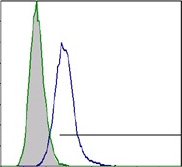Tnfrsf1b Rat Monoclonal Antibody [Clone ID: HM102]
CAT#: AM26345FC-N
Tnfrsf1b rat monoclonal antibody, clone HM102, FITC
Conjugation: Unconjugated Biotin
Other products for "Tnfrsf1b"
Specifications
| Product Data | |
| Clone Name | HM102 |
| Applications | ELISA, FC, FN, IHC, IP, WB |
| Recommended Dilution | Immunohistochemistry on Frozen Sections: The typical starting working dilution is 1/50. Flow Cytometry (1,5,6): 100.000 microglia cells were incubated with 10µg/ml PBS/1%serum for 30 min on ice. The typical starting working dilution is 1/50. Functional assays (2,3,5): In most cases 2 µg/ml acts agonistically. Immunoassays. Immunoprecipitation. Western blot (4): A reduced sample treatment and SDS-Page was used. The band size (s) is 75 kDa (Ref.4): The typical starting working dilution is 1/50. Positive Control: RAW264.7 cells. |
| Reactivities | Mouse |
| Host | Rat |
| Isotype | IgG2a |
| Clonality | Monoclonal |
| Specificity | The monoclonal antibody HM102 recognizes the extracellular part of membrane-bound TNF-RII as well as the soluble form of TNF-RII which is generated by proteolytic cleavage of the extracellular domain. The antibody is a agonistic receptor modulating antibody. It enhances in vitro TNF alpha responses by increasing the affinity of the soluble form of TNF-alpha for TNF-RII. |
| Formulation | PBS Label: FITC State: Liquid 0.2 µm filtered Ig fraction Stabilizer: 1% BSA |
| Concentration | lot specific |
| Purification | Protein G Chromatography |
| Conjugation | FITC |
| Storage | Store undiluted at 2-8°C. |
| Stability | Shelf life: one year from despatch. |
| Gene Name | tumor necrosis factor receptor superfamily, member 1b |
| Database Link | |
| Background | The soluble form can still bind TNF-alpha with high affinity and functions as a TNF-alpha antagonist. TNF-alpha is an important signalling protein in the immune system which can activate inflammatory responses, induce apoptosis, regulate cellular proliferation, and may even promote cancer progression. TNF-alpha can bind to two structurally distinct membrane receptors, TNF-RI and TNFRII, which have both distinct and overlapping downstream signaling cascades. TNFRI is believed to be expressed on nearly all cell types, whereas TNFRII exhibits more restricted expression, being found on certain subpopulations of immune cells and several other cell types. A dominant role of TNFRII has been shown in thymocyte activation by TNF-alpha, whereas induction of cytotoxicity and other functions are mediated largely by TNF-RI. TNF-RI is equally well activated by both the 17 kDa soluble and 26 kDa membrane-bound form, whereas TNF-RII is activated only by the membrane bound form of TNF-alpha. TNF-RII is present on most cell types and is considered to play a prominent role in cell stimulation by TNF-alpha. The TNF-RII molecule is shown to be responsible for stimulation of activated T-lymphocytes by TNF-alpha. |
| Synonyms | Tumor necrosis factor receptor 2, p80 TNF-alpha receptor, TNFRSF1B, TNFBR, TNF-R2 |
| Reference Data | |
Documents
| Product Manuals |
| FAQs |
| SDS |
{0} Product Review(s)
0 Product Review(s)
Submit review
Be the first one to submit a review
Product Citations
*Delivery time may vary from web posted schedule. Occasional delays may occur due to unforeseen
complexities in the preparation of your product. International customers may expect an additional 1-2 weeks
in shipping.






























































































































































































































































 Germany
Germany
 Japan
Japan
 United Kingdom
United Kingdom
 China
China



